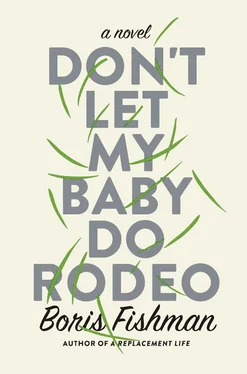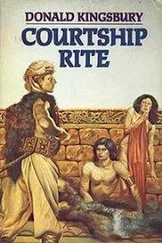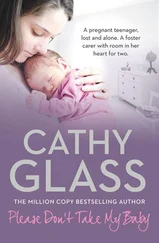“What do you see, Mama?” he said.
“I bet you’re hungry,” she said. “We should have gotten you something inside.” She wondered whether she could go back in. She could leave both of them in the Escape while she went in to get takeout.
“Who was that man?” Max said.
Maya hesitated. “He was the coffee man. He comes to the diners to give them their coffee.”
“When will I be allowed to drink coffee?”
“When you go to college.”
“I don’t want to go to college.”
“Oh, yeah?” she rustled his hair. “What do you know about it? Go say hello to your grandmother and grandfather.”
He turned to walk toward his father, but she held him. “Hold on. I’m sorry. That wasn’t the coffee man.”
“Who was it?”
“Did you get scared in the police car?”
Max shook his head.
“I’m sorry. I made a bad decision. Sometimes I do that. I’m sorry. Okay?”
“It’s fine,” Max said. “I wasn’t scared. Who was that man?”
Maya laughed sorrowfully. “That was a new friend. Like Oliver is for you. Do you miss Oliver?”
“He borrowed three books.”
“Is he the kind of person who returns the things that you loan him?”
“I don’t know,” Max shrugged. “I’ve never done it before.”
“Why did you agree this time?”
“I thought I would miss him.”
Maya bit her lip. “You’re a very good friend to him. And he to you.”
“How do you know if someone is a good friend?” Max said.
“A friend is if you feel good about them in your soul.”
“What’s a soul?” Max said.
Maya laughed and nearly let a tear fall. She took his ears in her hands and rubbed them like wishbones. “A soul is that part of you. . It’s that part of you where you’re the most honest about yourself. It’s always the truth in your soul. Does that make sense?”
“Am I honest?”
“You’re more honest than anyone I know.”
She let him go. She circled the SUV until she was out of Max and Alex’s sight, slipped to the ground, and leaned against its sturdy black frame. She stared up at the blinding light until it started tears again. Here were reasons for a trip far from home in a big car: The sun was strong enough to set off tears in her eyes, the Escape large enough to conceal her as they fell to the ground.
The Rubins drove past Badlands National Park/Pennington County Campground even though the sign advertising it was large and clear — too clear against the burnt-gray nothingness that it fronted. They drove past in a unanimous wish — so rare for them unanimity these days; perhaps they wished to savor it — for the campground to turn out to be some place other than the fenced-off patch of hard ground to which they reluctantly returned. The hard-baked pan of the plot was rejected even by plants. They gazed longingly at a rickety-looking motel off on a ridge — it seemed grand. The campground fence was strung with warnings against rattlesnakes, exhortations to conserve water, regulations regarding campfires, the opening and closing hours of a little shed on the edge of the lot that said OFFICE. How could a place of so few amenities require so many regulations? The Americans were regulated even when practicing wildness. In Kiev, Maya and her schoolmates had crept into the Alexeyevsky Theater at night because the city did not bother to keep it locked. They acted out their favorite film scenes on stage and drank moonshine in the aisles. They always deposited a bottle with the old watchman so that he would be amiably distracted. They did clean up when they were done — they weren’t savages.
On exiting the Escape, Maya was buoyed a little by the dry, sweet, grassy air. Where was the grass? She could see only puckered gray stone — she thought of small elephants. The day was enjoying its best heat at this elevation at this time of year; Maya turned her face up and closed her eyes, letting the light wind whip her hair. Now it carried the sound of rustling grass, and again she looked around, as if she had heard speech in an empty room. Perhaps neither humbleness of imagination nor low funds were responsible for the bare facilities; perhaps they were meant to accentuate the views that lay open in every direction. The terrain looked like a cardiogram — the stone was beating healthy and sound. She remembered her husband and son; they were off to the side of the small dirt parking lot, waiting for her. She called out to Alex to set up the tent while she and Max registered. “Which one?” Alex said, pointing at the numbered campsites. “Any one,” she said and, after Max joined her, went into the office.
Something had expired and then expired again in the low-ceilinged front room of the shed. Behind the wood partition, a red-faced man in a check shirt and suspenders was clutching a telephone and listening loudly to the senselessness on the other end of the line. Maya had been enlarged by the landscape, he by elk sausage in gravy: mother and child could fit inside of him twice. A moth the size of Maya’s fist banged around a desk lamp, on despite the blasted severity of the light outside. Other insects had tattered the lampshade into a rag that barely held on to the harp.
“Well, Carla, your piss don’t smell like gingersnaps, either,” he yelled and slammed down the phone. Its tinnitic echo rang through the stale air of the office. Maya smelled gasoline, dried meat, wet straw. The attendant flexed a pair of porcine ears. A nameplate identified him as Wilfred Shade. “How can I help you?” he sighed. He held up a palm the size of Maya’s head.“I’m sorry, little fellow. Pardon my language.”
“Is piss the same as pee?” Max said.
The adults smiled. “We’re not laughing at you, honey,” Maya said. “Come here.”
“There’s two ways of saying things,” Wilfred Shade said. “After you walk out of here, you could say: ‘Mr. Shade, he was big.’ Or: ‘Mr. Shade’s fat.’ What would you say?”
Max looked up at his mother. “We would call Mr. Shade big, honey,” Maya said.
“Your mom is nice, see,” Wilfred said. He pushed a paper at Maya. “Fill this out.” He retreated into the back office, but a moment later, his big head emerged. “You want an Oreo, either of you?” he said.
“Here is the one boy in the world who doesn’t like sweets,” Maya said.
“You and I part ways there,” Wilfred said, and disappeared. Then his head popped out again. “I’ve got graham crackers. Dieter’s delight.”
Maya smiled wanly and thanked him, and now the attendant vanished for good.
“Max?” Maya looked down at her son. “Are you all right? You haven’t said much. Did something upset you?”
“Why did you cry?”
“When?”
“You went around the car and cried.”
“No, no. I had something in my eye. And then the sun here is so strong. I started tearing up. But I’m fine, honey — fine. Look at me — I’m laughing.”
“Why did we come here?” he said.
“We’re on vacation, sweetheart. You’ve never really been on vacation with your mama.”
“If we’re on vacation, why are you crying?”
Maya heard the television go on in the back office. Through the doorway, Wilfred was breathing heavily into a half-bitten Oreo. Was he trying to give her privacy? But she did not care about being overheard. As if feeling her stare on him, Wilfred turned back to look at her. “What I do,” he said, “is I bite and then count. To twenty-five, and sometimes to fifty, if I can manage it. This way I eat five instead of the whole pack.”
“You look great,” Maya said.
“Ho-ho-ho,” Wilfred said, and turned back to the television.
Maya crouched in front of her son.“Do you know what, Maxie? It’s okay to cry sometimes. Good, actually. We’ve got laughs inside us, but cries, too. And they both have to come out. Sometimes, they come out at the wrong moments. They don’t listen like that.”
Читать дальше












